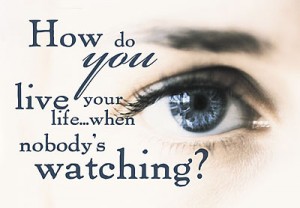“Exhibitionism is liberating, because it represents a refusal to be humble.” I absolutely loved this sentence. It’s so good, it should be made into a bumper sticker.
In this article, Albrectslund coins the phrase “participatory surveillence” – the idea that surveillence isn’t always a negative thing, that it can in fact be “social and playful.” Surveillence, he says, is “fundamentally social.” And of course that is true. It is not always a bad thing to be observed: sometimes, being observed is what brings out the best in us.
Social media gives us more opportunities to be observed, making exhibitionists of us all. Sometimes, of course, people share more information than anyone really wants to know, but as an information professional, I believe that you can never have too much information. We can filter out what we don’t want to see, but having the option to see everything about each other is, I think, a very powerful thing.
Being observed can change behaviors. I recently cataloged one of those inspirational posters that elementary teachers hang in their classrooms (yes, we have a curriculum collection at my academic library). The poster read: “How do you live your life when nobody’s watching?” I think the poster was trying to teach kids to take responsibility for their actions all the time, not just when an adult is watching and they might get in trouble. It will be interesting to see whether social media is a benign Big Brother that may, in fact, teach our kids to become more responsible, better behaved citizens. Or am I dreaming?

4 replies on “Thoughts on Albrechtslund’s “Online social networking as participatory survelliance”:”
Good campaign poster! I’ve thought for a few years now that universities should have a mandatory internet skills class.
People often use the term digital natives to discuss students coming into university now. But that term implies to me that they are doctrinated into some sort of culture where they know the customs and laws, which is clearly not the case. If you ask them who has access to the information they put on their Facebook wall, they undoubtedly will not be thinking of third party businesses or applications that their friends are using. Until our online profiles are real aliases of ourselves, we won’t be able to talk about digital natives in any true sense.
Hi Emily,
Really enjoyable post. I especially liked your final paragraph, where you point out that “[b]eing observed can change behaviors.” Once upon a time, when I had a Facebook account, I used to get extremely frustrated because I had a hard time balancing the exhibitionism aspect of Facebook with the surveillance aspect. It would be an understatement to say that I had a variety of different groups of friends on Facebook: many political conservatives (often also Christians and Mormons, as they make up most of the population of the city that I’m from in Alberta), friends from my school’s NDP student group, adolescents from a summer camp that I had worked at, and some parents of the children that attended the daycare I worked at. A couple of my professors were on my friends list, as well as some of my past and present employers.
In a rage one day over a “Feminists for Life” poster (I’d like to take this opportunity to say that there’s no such thing!), I used my phone to update my Facebook status to reflect how I felt about that stupid poster. When I got home and checked my Facebook I was amazed at the number of responses I got: some of my long-time friends, most of whom are Christian, had unfriended me, some parents from the daycare that I worked at sought me out the next day at work to tell me that they disagreed with me, and friends of mine on Facebook started fighting with each other on my wall and on theirs. It was a complete disaster – and in the end, my venting wasn’t worth the stress of dealing with the subsequent postings, inbox messages, and angry phone calls.
This relates to the performative aspect of social media that we’re been discussing on Vista but I’d also like to use it to answer your last thought. You said “It will be interesting to see whether social media is a benign Big Brother that may, in fact, teach our kids to become more responsible, better behaved citizens.” I certainly hope so, and I hope that social media can be used to promote meaningful, respectful dialog on issues that many disagree on. Do you see a library social media platform helping to accomplish this? If so, how?
Thanks for your excellent comments, Maggie. I hadn’t yet realized it, (as a fairly new FB user), but what you have described is exactly why I don’t like posting anything on FB. I have, in fact, yet to do anything other than send direct messages on FB, or comment on other people’s posts – I have never posted anything on my own wall. Why? Because I have nothing to say to all my “friends” at the same time. Maybe “Happy Holidays” come December – but then what about my Muslim friends? Or my atheist friends? No, mass group communication just does not work for me.
Excellent posts. I agree with Jon’s idea about a mandatory Internet skills class for teens. After that introduction in high school, I would then like to see librarians teach a course on media literacy where the issues discussed in our class would be given a full airing. A study of media literacy would not be complete without discussing how to retrieve scholarly information from the library as well.